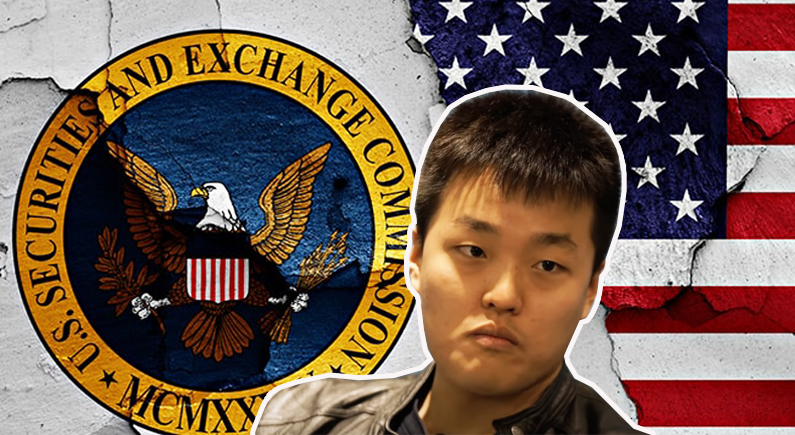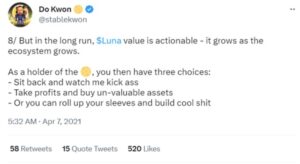Report: the SEC sharpens its knives; goes after Do Kwon

In a case that seems to have broad implications for swathes of the cryptocurrency sector, the US Securities and Exchange Commission charged Do Kwon and Terraform Labs with defrauding investors via a multi-billion-Dollar scheme.
In a lengthy 55-page civil complaint, the SEC said Do Kwon and Terra Labs sold an “array of interrelated tokens” between April 2018 and May 2022, which ultimately led to a $40 billion loss in market value – creating “devastating” losses for retail and institutional investors in the United States.
Unfathomable losses
“We allege that Terraform and Do Kwon failed to provide the public with full, fair, and truthful disclosure as required for a host of crypto asset securities, most notably for LUNA and Terra USD,”, said SEC chair, Gary Gensler in a prepared comment. “We also allege that they committed fraud by repeating false and misleading statements to build trust before causing devastating losses for investors.”
But the big news isn’t as much Do Kwon’s fraud charges as it is the wider implications this legal pursuit may have on crypto. After all, Do Kwon is already on the run from South Korean prosecutors and has an Interpol red notice with a barred passport. The SEC’s lawsuit comes ten months after first reports of the incident emerged.
Terra’s doom-loop
Terra’s ecosystem tokens included LUNA, an algorithmic stablecoin UST, and mAssets, which were security-based swaps designed to pay dividends by mirroring stock prices of US companies.
In no uncertain terms, the government body said that these tokens were unregistered securities subject to federal law by US standards. A security is a fungible, negotiable financial instrument that holds some type of value. A security can represent ownership in a company in the form of stock, a creditor relationship with a governmental entity or a corporation represented by owning that entity’s bond; or rights to ownership as represented by an option.
Financial assets which fall under this category must be registered with the US-SEC if US investors are involved prior to being offered. This requirement is one the crypto sector has long resisted.
The development of this new lawsuit could have major implications for current and upcoming tokenised projects which are decentralised in-name-only. For example, many decentralised finance protocols are in a race to offer on-chain versions of bonds, exchange-traded funds, and stocks. Their business model could be at risk.
And stablecoin providers could even begin to reconsider their token offerings too, or attempt to get ahead of this developing trend by registering with the SEC.
“This may have very far reaching implications for many projects,” tweeted managing partner at San Francisco law-firm Brookstone P.C. Collins Belton.
Research firm Delphi general counsel spokesperson, Gabriel Shaprio, said on Twitter that the SEC’s case has “three firsts” — it states a stablecoin is a security, a tokenized or synthetic token is also a security, as are wrapped tokens. However, this may not be correct given the clear differences between an algorithmic stablecoin like TerraLuna’s UST, and a registered-company USDT-issuer, Tether.
That said, litigation will certainly take its time and breakdown concepts in the years and months ahead. Many arguments remain up in the air.
Toxic debt
Terra’s spectacular collapse in May 2022 entrenched the bear market for the remainder of the year, culminating in FTX exchange’s implosion. Industry credibility fell to never-seen-before levels as various acts of betrayal drew further into the limelight.
When the UST peg slipped, it triggered cascading losses linked to tokens like LUNA which became worthless. On top of that, the Luna Foundation also had to sell its 80,000 Bitcoin reserves in an attempt to stop the downward spiral. The attempt proved futile, and pulled down other former crypto giants and household names such as Celsius, and hedge fund Three Arrows Capital with layers of toxic debt.
Eventually, this caused financial distress in FTX, which was subsequently found to not only be the bag-holder of this toxic debt, but fraught with fraud after its bankruptcy declaration in November.
Howey Test
A major precedent for figuring out whether a market instrument is a security or not was established in a 1946 Supreme Court ruling. The Howey Test determined that a transaction is deemed an investment contract if a buyer has an expectation of making a profit. For about two years, Gensler has said that many cryptocurrencies meet the Howey Test and the sector should comply with United States laws. However, this approach has been deemed to have zero nuance, even from within the agency itself.
In its complaint, the SEC said Kwon also touted LUNA’s value proposition in an April 2021 tweet. The agency noted that kwon repeatedly told investors Terra’s tokens would rise in value.
The latest action taken by regulators against crypto firms in recent months is worth exploring. As it appears to be a ‘give them a finger and they’ll take the hand’ scenario. Earlier this month, New York state’s Department of Financial Services ordered Paxos, another finance-infrastructure company in the US to stop issuing BUSD tokens.
Staking-as-a-Service
Prior to that, the SEC also went after regulated exchange Kraken, settling a case in which the centralised exchange agreed to shutter its staking-as-service program and pay a $30M penalty. The supposed problem: Kraken did not register the staking offering as a security or investment contract.
This is one of the more contentious claims but Gary Gensler, who was mocked online by Kraken CEO Jesse Powell following the settlement.
Meanwhile, Do Kwon, who is supposedly hiding from authorities in Eastern Europe hasn’t made any public comments on the SEC lawsuit.







